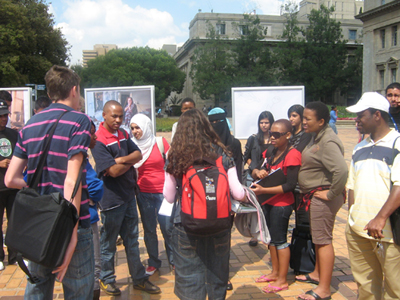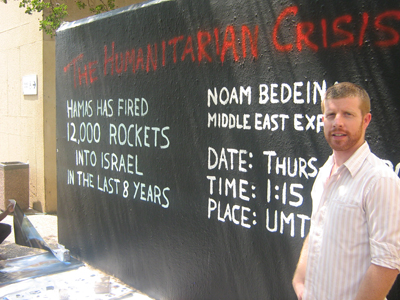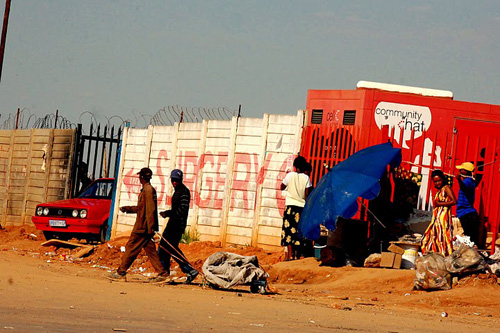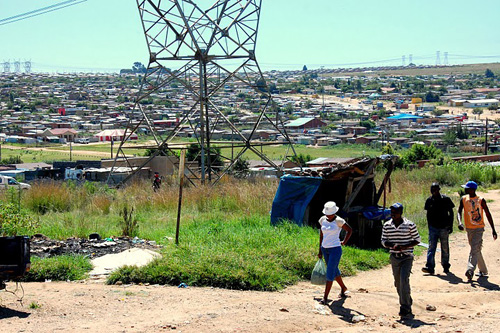The Gaza narrative serves only one purpose: to distract the rest of the world from pressing issues and humanitarian crises taking place around the globe.
As the director of the Sderot Media Center, I was recently invited by the South African Union of Jewish Students (SAUJS) in a CAMERA-sponsored trip, to create a media awareness campaign presenting Israel’s side during the anti-Israel events on South African campuses.
The tragic reality of S’derot, a reality which resulted as a direct consequence of Gaza rocket terror supported financially, politically, and militarily by Iran, is the only humanitarian issue that shows Israel’s side of the conflict in relation to the Gazan narrative. This overlooked element of the Arab-Israeli conflict is the reason why I was asked to come to South Africa: to show the devastating effects that Iranian support of Hamas’s rocket terror has had on innocent Israelis.
Watch SMC’s Director Noam Bedein on South African news channel SABC!
Multi-million dollar campaigns for the Gaza narrative, such as promoting modern myths of an Israeli siege or blockade, by organizations like New Israel Fund and Breaking the Silence, divert the public’s attention from very real issues surrounding the growing power of Iran and its support of jihadist terrorism both in Israel and around the globe.
When I spoke to audiences in South Africa, I told them of my experience presenting the S’derot story before South African Judge Richard Goldstone and the UN Committee last July. The fact that Judge Goldstone fell asleep during my presentation on S’derot children under attack, was, to me, a general reflection of the world’s silence to Islamic terrorism. Indeed, Iran’s radical Islamic agenda is limited not only to the Middle East, but is spreading across the continent of Africa as well. Iran financially supports radical Islamic groups and cells in Somalia, Sudan, Uganda, Congo, Zimbabwe, and even South Africa. It is Iran’s support of Islamic terror that is the real human rights abuse in need of international address.
A week before traveling to South Africa, I prepared constantly, studying my talking points to counter any accusations or ridiculous comparisons that have been used by Palestinian Solidarity Coalitions on campuses around the world. I was also aware that the South African universities which I would be lecturing would be the most hostile campus environments around.
Sure enough, a day before my first presentation, a mob of Muslim students attacked members of the South African Union of Jewish Students who were setting up the Sderot Media Center photo gallery to accompany my presentation. One member was called a “___ Jew” and even a college professor spat out “Fascists Nazis” at us. If it wasn’t for the undercover campus security officers walking around, it would have been unsafe for me to conduct these presentations on S’derot’s human story. The Vice President of SAUJS said that this was the first time in 20 years that such an event almost got so badly out of hand.
During my visit, I learned more about South Africa’s apartheid past and the way a small white minority controlled every aspect of the black majority’s way of life including education, voting, and employment. I realized that I was in a country that still had the largest economic and social gaps in the world, even after 15 years since the apartheid system was abolished.
Photo exhibition on WITZ University campus
South African human rights groups’ embrace of the Palestinian narrative is a distraction from South Africa’s own human rights abuses and issues that are impacting the country today. The white minority of South Africa still enjoys the highest standard of living while some 50 percent of South Africans live in poverty. The country suffers from stratospheric levels of crime and has one of the world’s highest rates of HIV/AIDS epidemics which, combined with poverty, have left 1.2 million orphans and countless homeless.
But all of these issues seem to take the back seat when it comes to Israel and the Palestinians. In Cape Town, the Israeli Apartheid Week featured ‘Open Shuhada Street,’ a street in Hebron closed to Palestinian Arabs which became a major apartheid marketing symbol for anti-Israel groups. The fact that as an Israeli Jew I am not allowed to walk in 97% of Hebron, the capital of the kingdom of Judea over 2,700 years ago, is blatantly ignored. Also overlooked are the reasons why Shuhada street has been closed; numerous attacks on the small Jewish population in Hebron by Palestinian fanatics as well as the eruption of the ‘second intifada’ the year after the street was reopened in 2000 made it unsafe for the street to be opened for security reasons.
Shuhada Street is one street out of the millions of streets in Israel whose history has been twisted to represent the Palestinian narrative. What about the millions of streets where Arabs and Jews do live together side by side in Israel? In S’derot, a city where thousands of Palestinian rockets have struck at civilian homes, schools, and neighborhoods, there are dozens of Arab families who live peacefully alongside Jews in the same neighborhoods.
l
‘The largest economic and social gaps in the world’. Photo: Noam Bedein
At Sapir College, a local Israeli college outside of S’derot, where I studied, there were countless Arab students learning for their degrees in a Jewish Israeli college. There are Israeli Arab members of Knesset, and every Israeli Arab has a right to the same education and health services as Israeli Jews.
More importantly, what about the fact that 120,000 Ethiopians living in Israel all share the same rights as every other Israeli? Tuvia Sadtik, an Ethiopian husband and father who lives in S’derot, walked thousands of kilometers through Sudan and Egypt to immigrate to Israel. He came to the Jewish state out of his own free will, with Israel being the only country in the world to host a black African community with open arms.
I fail to see the Israeli ‘apartheid’ that these self-righteous South African humanists and Muslims are so angry about. There is no segregation in Israel; human rights are extended to everyone. Where is their outcry on the human rights abuses in Iran, Gaza, Syria, Afghanistan, China, Saudi Arabia, and countries from the UN human rights council?
And finally, one cannot compare the context of situations between Israel and South Africa. Security issues have always plagued the existence of the Jewish state as radical Islamic elements terrorize Israeli civilians precisely because Israel is a Jewish state and not an Islamic republic. The Palestinian terrorists who fire rockets at S’derot do not care that it is a city full of Jewish, Christian, Ethiopian, Russian, Indian, Burmese, and Arab Muslim civilians. They target the city because they regard all of Israel pre-1948 to be their own.
Noam Bedein is a photojournalist, lecturer, and the director and founder of the Sderot Media Center (www.SderotMedia.org.il). Noam gives briefings to foreign government officials, embassies, foreign press, and student groups from around the world.
















Shalom!
I am myself in a public discussion in a newspaper these days. I am writing against left-side politicians who seem to think that Israel is the big violater of human rights. I try to defend Israel, and I will continue to do so.I just want to encourage you to keep on with your information-work in Sderot Media Center. I think your work will bear fruits.
With love from Norway,
Per Sverre BÃ¥rdsen
One more of Per’s statements, which i could copy. Keep up your good work and be blessed.
Thank you Mr Bardsen. Your words are appreciated and encouraging.
We hear mixed reports about the attitudes of Norwegians toward Israel. As a journalist, you probably have with others in your profession and with the media in general. What are the feelings and expressions of the various sectors in Norway? If you would be good enough to resdpond perhaps Sderot Media would print it. Thank you again. RegioFilia